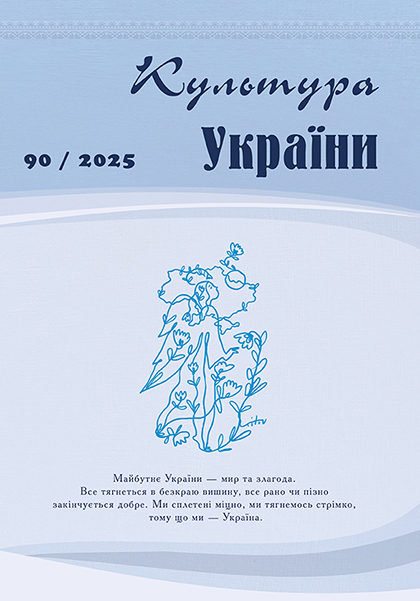Глобальна криза сучасної культури: стан та перспективи
DOI:
https://doi.org/10.31516/2410-5325.090.01Ключові слова:
глобальна криза культури, технологічний розвиток, моральні аспекти, екологія, людська цивілізація, екологічна приреченість, духовні цінностіАнотація
Проаналізовано глобальну кризу сучасної культури, визначено її стан і перспективи. Відзначено наявність дисбалансу між технологічними та морально-ціннісними аспектами буття культури, результатом чого стало загострення проблем, що пов’язані з екологією, і підвищення загрози самому існуванню людського виду. Описано стан «екологічної приреченості», запропоновано шляхи виходу з нього. Наголошено на важливості якості та орієнтирів матеріальних і духовних цінностей, а не на зростанні об’ємів нинішнього виробництва. У контексті виживання сучасної культури акцентовано на необхідності поширення нових етичних принципів, гуманістичних цілей розвитку взаємозв’язків як у безпосередньо суспільстві, так і між людиною й природою. Розглянуто освітню сферу як своєрідний «лакмусовий папірець», що дозволяє оцінити реальний зв’язок духовних цінностей із повсякденним буттям людини. У висновках згадано головні прояви кризи нинішньої культури, подолання яких є першочерговим завданням у процесі входження людства в новий етап культурної історії.
Посилання
Bohdanov, V. S. (1995). Problems of innovating modern education in the system of philosophical and sociological arguments. Problemy osvity, 3, 22–28. [In Ukrainian].
Forrester, J. W. (1961). Industrial Dynamics. The M. I. T. Press; Massachusetts Institute of Technology. [In English].
Fromm, E. (1968). The Revolution of Hope. Towards a Humanized Technology. Harper & Row. [In English].
Frosh, P., & Georgiou, M. (2022). Covid-19: The Cultural Constructions of a Global Crisis. International Journal of Cultural Studies, 25(3/4), 233–252. https://doi.org/10.1177/13678779221095106 [In English].
Hendin, H. (1975). The Age of Sensation. Norton. [In English].
Jaspers, K. (2021). The Origin and Goal of History. Taylor & Francis. [In English].
Kadijević, A. (2022). Heritage and the Global Crisis: The impact of geopolitics on cultural historiography and monument protection. Nasledje, 23, 177–190. https://doi.org/10.5937/nasledje2223177k [In English].
Laszlo, E. (1977). Goals of Mankind. A Report to the Club of Rome on the New Horizons of Global Community. Dutton. [In English].
Letisser, G. (2023). Queering the canon in Middlemarch the series. Collaborative Digital Creation and the Crisis in the Humanities. Theory Now. Journal of Literature, Critique, and Thought, 6(2), 55–80. https://doi.org/10.30827/tn.v6i2.27902 [In English].
May, R. (2024). Tackling Global Crises with the humanities: ASU’s new BA in culture, technology and environment. Enrollment Management Report, 28(6), 7–8. https://doi.org/10.1002/emt.31285 [In English].
Meadows, D., Meadows, D., & Randers, J. (1974). Dynamics of Growth in a Finite World. Mass. [In English].
Meadows, D., Meadows, D., Randers, J., & Behrens, W. (1972). The Limits of Growth. Universe Books. [In English].
Mesarovic, M., & Pestel, E. (1974). Mankind at the Turning Point. Dutton.
Mische, G., & Mische, M. (1977). Towards a Human World Order. Paulist Press. [In English].
Nykytenko, V. (2023). Global civilization of the XX century: decline or revival? In O. I. Bezliudnyi (Ed.), Nauka. Osvita. Molod (pp. 253–257). Pavlo Tychyna Uman State Pedagogical University. [In Ukrainian].
Peccei, A. (2013). The human quality. Pergamon Press. [In English].
Roman, S., & Loebl, E. (1977). The Responsible Society. Cambridge University Press. [In English].
Roy, O. (2024). The Crisis of Culture: Identity Politics and the Empire of Norms. C Hurst & Co Publishers. [In English].
Saint-Marc, P. (1971). Socialisation de la nature. Stock. [In English].
Schweitzer, А. (1996). Kultur und Ethik. C. H. Beck. [In English].
Sheiko, V. M. (2001a). Culture. Civilization. Globalization (late XIX — early XXI centuries): Monograph. (Vol. 1). Osnova. [In Ukrainian].
Sheiko, V. M. (2001b). Culture. Civilization. Globalization (late XIX — early XXI centuries): Monograph. (Vol. 2). Osnova. [In Ukrainian].
Sheiko, V. M. (2011). Culture of Ukraine in the globalization and civilization dimension (historical and methodological aspects): Monograph. Institute of Cultural Studies of the National Academy of Arts of Ukraine. [In Ukrainian].
Sheiko, V. M., & Bohutskyi, Yu. P. (2005). Formation of the foundations of cultural studies in the era of civilizational globalization (second half of the XIX — early XXI centuries): Monograph. Heneza. [In Ukrainian].
Sheiko, V., & Aleksandrova, M. (2009). Culture and civilization in the historical and cultural thought of Ukraine in the era of globalization: Monograph. Institute of Cultural Studies of the National Academy of Arts of Ukraine. [In Ukrainian].
Sinai, R. (1978). The Decadence of the Modern World. Mass. [In English].
Tanska, L. V. (2023). Globalization of culture in the context of the dynamics of socio-cultural systems. Visnyk Natsionalnoi akademii kerivnykh kadriv kultury i mystetstv, 2, 42–47. [In Ukrainian].
Tinbergen, J. (1976). Reshaping the international order: a report to the Club of Rome. Dutton. [In English].
Verkuil, A. H. (Ed.). (2024). Start-up Cultures in Times of Global Crises. Springer Nature Switzerland. https://doi.org /10.1007/978-3-031-53942-8 [In English].
##submission.downloads##
Опубліковано
Номер
Розділ
Ліцензія

Ця робота ліцензується відповідно до Creative Commons Attribution-NonCommercial-ShareAlike 4.0 International License.
Автори, які публікуються у цьому журналі, погоджуються з наступними умовами:
У разі публікації статті в журналі «Культура України», автори зберігають авторське право, а також надають право журналу публікувати оригінальні наукові статті, що містять результати експериментальних і теоретичних досліджень і не знаходяться на розгляді для опублікування в інших віданнях. Всі матеріали поширюється на умовах ліцензії Creative Commons Attribution-NonCommercial-ShareAlike (BY-NC-SA), яка дозволяє першу публікацію в цьому журналі, а також розповсюдження роботи з визнанням авторства цієї роботи, на тих самих умовах, з некомерційною метою.
Автори мають підписати заяву, яка є угодою про надання прав редакції на публікацію статті в друкованому та електронному вигляді. Заява надсилається на поштову (оригінал) або електронну адресу (сканована копія) Редакції журналу.
Автори мають право укладати самостійні додаткові угоди щодо неексклюзивного розповсюдження роботи у тому вигляді, в якому вона була опублікована цим журналом (наприклад, розміщувати роботу в електронному сховищі установи або публікувати у складі монографії), за умови збереження посилання на першу публікацію роботи у цьому журналі.
Під час подачі рукопису статті для опублікування у збірнику «Культура України» автори погоджуються з тим, що, у разі прийняття статті до публікації, її можна буде розмістити в електронних архівах та базах даних з обов'язковим зазначенням авторства і збереженням авторських прав у повному обсязі за авторами. У тексті самої роботи мають бути в повному обсязі представлені джерела зовнішньої інформації – у вигляді списків джерел літератури (у т.ч. особисті раніше опубліковані роботи авторів). Автори рукопису статті зобов'язані належно оформляти запозичення у вигляді цитат або посилань. Будь-які форми плагіату неприпустимі.


